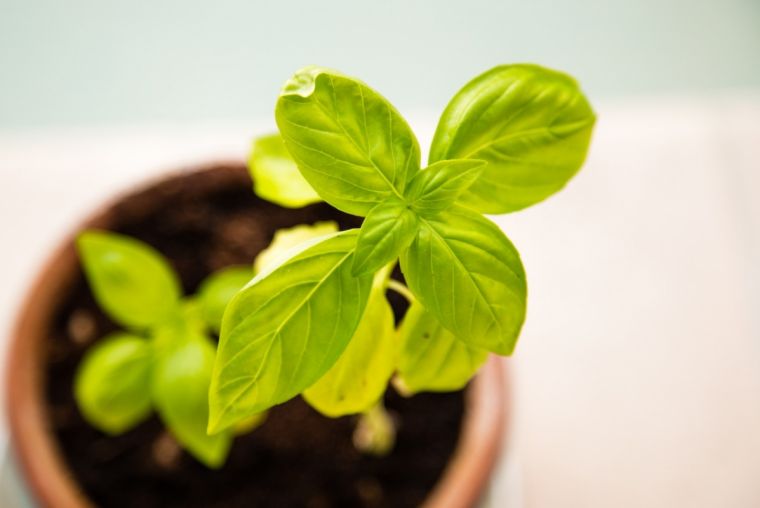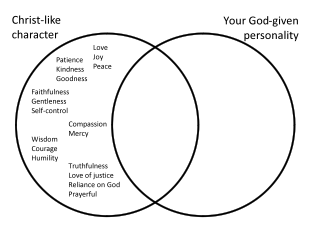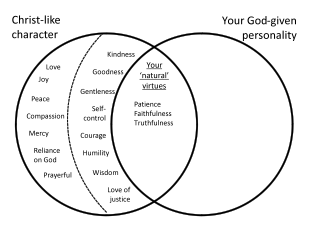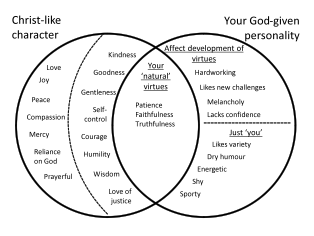In-tension-al faith: How to be more like Jesus and more like yourself
I wish I were different. The grass is always greener, isn't it? I think my ideal me would be more spontaneous, more funny, less skinny, less melancholy, sometimes even less thoughtful. And what's true in general life is true in spiritual life as well. These nagging flaws, those tiresome limitations...
The urge to grow is embedded in all living organisms. Cells divide. Species adapt. But what does it mean to grow as a person? Put bluntly, what's the end goal? What are we aiming to be? Or who, perhaps? I want to suggest that, from a Christian perspective, the goal is to become both more like Jesus and more like our true selves.

More like Jesus
Who's your hero? I must confess that before I really wanted to become like Jesus, I wanted to be like John Robertson, a tricky left-footed winger who played for my childhood heroes, Nottingham Forest. Every break time at school, after school at the park, in the garden at home – I practised. I even learned to play with my left foot, despite being naturally right-footed. I wanted to get those skills, to play like my hero.
This idea of becoming like your hero is not so very far from what we're looking at here. But to really grasp its importance to the Christian life, we need to address the subject a bit more theologically. It's not just about choosing Jesus as our spiritual hero, although that is a good start. Lots of people do that, but there are deeper realities binding us to Jesus when we become a Christian. Jesus is not just our hero, he becomes our very identity. We are, quite literally, in Christ.
This is not just a pretty phrase: when we become Christians, Jesus promises to dwell in us by his Spirit (John 14:17, Acts 2:41). In that sense, Christ is in us. But since Christ is in all those who are his followers, we are joined together in a deeper spiritual sense, so that not only is Christ in us, but we are (together) in Christ –the expression of the risen Jesus' body on earth in 1 Corinthians (12:13f).
It follows that the call for those who are in Christ is to be like him. If we want to be fully human, if we want to become the people we were made to be, if we want a full and complete relationship with God, we need to be like Jesus.
So Jesus is more than a hero to emulate. We want to be like him because God's purpose all along has been to draw us into this radical new society of people following Jesus, each of whom has his very Spirit inside them, slowly transforming us to do precisely that. Our purpose, our identity, our call as Christians is to become like Jesus, the true human being, fully manifesting the image of God with which we were created.
Indeed, the very word Christian means 'little Christ'. If you are a Christian, you are a little Jesus: your self-understanding, your motivation, your lifestyle is meant to look as much like Jesus as possible. You are in Christ, Christ is in you.
Universal and unique
But if the goal is for all of us to become more like Jesus, does that mean that we are all meant to be the same? To be identikit Christians, who speak and act and live in the same way?
Not at all! The key distinction to make here is between character and personality. If our character is meant to grow to become like Jesus, our personality is unique and God given, and ought to flourish similarly. In this sense, in becoming what Jesus calls 'teleios' (ie mature, complete, whole) we become more like our true selves. To summarise: 'Our goal as Christians is to develop a Christ-like character within our God-given, unique personality.'
In other words, we have both a universal challenge and a unique one. The universal challenge for any would-be follower of Jesus is forming a Christ-like character. Let's start where St Paul does: love, joy, peace, patience, kindness, goodness, faithfulness, gentleness and self-control – not a bad list! Christ is in all of his believers, helping them towards this universal goal.
And yet, since we are also uniquely made individuals, we can all manifest these virtues in our own way, as the individuals that we are.
Imagine it like a fingerprint. Take a look at your index finger. From a distance, every finger looks the same. Indeed even close up the contours of the tiny grooves look remarkably similar to the next finger on your hand. But in fact, every single finger on this planet is completely unique. Nobody else has the same index finger as you, or middle finger or even little finger. All possess the same characteristics, but all are utterly unique.
Piecing together personality
This is where we learn to evaluate our personality through new lenses. Defining personality is notoriously nebulous, but I want to work with the basic definition that your personality is what makes you, you. But that in itself breaks down into aspects of personality that overlap with the virtues that we have just described as part of character formation, and a whole lot of other things which sit outside that, which are 'virtue-neutral' ie they are not good or bad things in themselves. Being able to make this distinction is absolutely fundamental to developing both a Christ-like character and personality which reflects who you truly are.
Since this is such a nebulous subject, you might like to earth it by spending five minutes writing down what makes you, you. What is your personality?
If you're anything like me, you'll have written down lots of things, probably all jumbled together. Now take a look at the simple diagram below, where I've jotted down the basic aspects of a Christ-like character: which of these do you naturally have – at least to some degree? I should stress that ultimately these are all things we need God's help to cultivate, even our 'good points': but I guarantee you will naturally be more prone to some of them than others. If you find that difficult to answer yourself, ask your friends and family.

Once you've got some idea of what you might call your 'natural virtues', cross them off the list in the character circle and move them into the part of the diagram where your character and personality circles overlap. Don't worry if (like me) you haven't got many to move into the middle – that would be normal, and a helpful reminder of how much transforming God has to do in most of us! If you're really into this, rearrange the list of remaining character virtues within the circle to reflect those which are closer to your natural virtues and those which are further away. When I did this exercise, it looked like this:

This should already have given you some very significant insights: namely the aspects of Christ-likeness which come more naturally to you – or at least, are slightly less hard than the rest – and the ones which will prove a particular challenge. Hopefully, this first part of the exercise has already opened out a significant part of your life's work from now: namely to develop the virtues that don't come naturally, which can only be the fruit of the Spirit. In other words, that will only develop in you through a combination of God's supernatural power and your effort and determination to harness that power through prayer, discipline and the support of others.
Now fill in your 'personality' circle with your remaining items, ie the ones which are not about virtues or character but just who you are: spontaneous, funny, melancholy, energetic etc. If you can, try to do this by separating out the items which you think might have an effect on the formation of particular virtues, and others which are just 'stuff about you'. And if you can't do that yet, just write them all into the circle anyway. Mine looks like this:

To be or not to be?
Before we start to ask some interesting questions about the diagram you've just come up with, it's worth making an observation. We tend to make virtues of things which are merely aspects of personality. For example, being funny is usually described as a good thing. Being stubborn is bad. But neither are in themselves morally good nor morally bad. Humour can put others down, stubbornness can persevere in demanding situations. Stubborn people also make very good church planters and evangelists. What is needed with all these characteristics is an understanding of how they relate to the formation of virtue – when they are good and when they are unhelpful.
To become like Jesus and retain your true self, we must work through these questions. We've already started by asking the first one: who are we? That may have been hard enough for many of us. But now we need to proceed by asking an even harder one:
Look at the items in your personality circle – which of these: (a) relate directly to any of the virtues that you find particularly challenging; (b) represent real flaws which can only stop you becoming like Jesus (c) are neither, but simply help to form your particular expression of Christ-likeness. If some examples would help:
(a) if you wrote assertiveness as one of your personality traits you might find that truthfulness and courage come fairly naturally, but humility and gentleness are trickier.
(b) If you have a naturally addictive personality, or a short temper, that is stuff that can only be described as something to work on changing, rather than something to encourage.
(c) could include any number of things, like funny/serious, risk-taking/cautious, energetic. Though even then, on reflection, serious people may have an issue with joy, risk-taking people with wisdom and self-control, cautious people with courage, and energetic people with reliance on God. Not necessarily, but it shows the value of honestly assessing your personality against the Christ-like character that God wants to form in you. Because ultimately God wants the cautious to be courageous and the risk-taker to be wise, as well as vice versa.
And I really believe that's possible. Don't accept the received wisdom that certain personality types are only capable of certain virtues. Risk-taking, for example, is not a virtue simply because someone does not think through the consequences. The cautious evaluater has the potential to be the biggest risk-taker of all, making the soundest judgements after the most careful thought.
God wants to use the personality He has given you fully for his glory. He is more than able to take any individual and cultivate all the virtues of Christ-like character if only we will submit to Him, trust the transforming power of His Spirit within us.... and also make the hard decision to choose to work on those virtues we find the most difficult.
Nevertheless, if you're anything like me, you will find that this exercise throws up both profound insights about yourself but also no easy answers. And there shouldn't be, or it wouldn't be in this series of articles. The point is that we need to affirm that God is calling us both to become like Jesus and to express that within the unique 'shell', if you like, of our true selves. A self that may be refined and even changed in certain ways as God moulds it into the likeness of his son, but nonetheless one that is uniquely us, with our God-given gifts, preferences and characteristics.
Rev Matt Trendall is Rector of Walton Churches Partnership, Milton Keynes.











